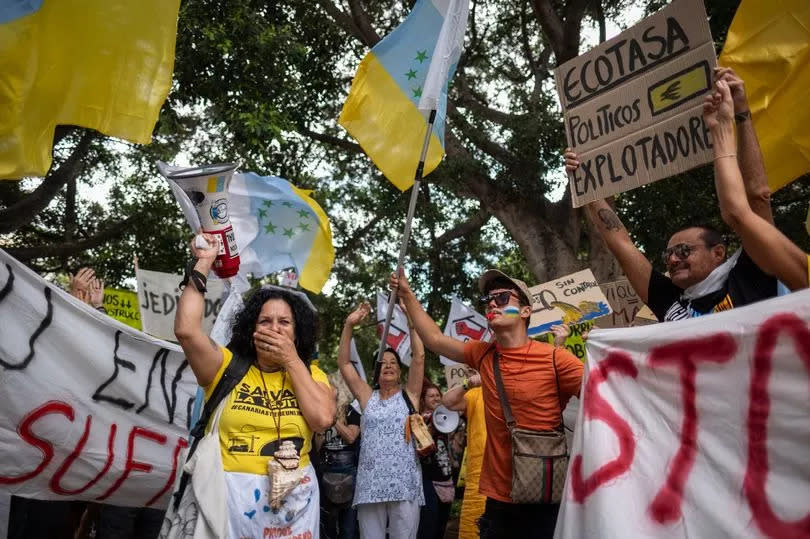Holiday islands plead with UK tourists to visit amid holiday cancellations

The Canary Islands have issued a plea to British holidaymakers, urging them not to cancel their trips despite local protests over mass tourism. Tens of thousands of residents have voiced concerns that the islands are being overwhelmed by the increasing number of tourists, as the popularity of this vacation destination continues to rise.
The Canaries, a group of seven Spanish-run islands off the coast of northwestern Africa, including Tenerife, Fuerteventura, Gran Canaria, Lanzarote, La Palma, La Gomera, and El Hierro, are renowned for their year-round sunny weather, making them a favourite among British tourists.
Tourism is the lifeblood of the islands, providing around 40 per cent of jobs. However, the influx of visitors has sparked tensions, with locals protesting against mass tourism due to its impact on living costs and housing prices.
READ MORE: Exact date 'Icelandic storm' to bring 4cm of snow per hour
Last year, it was estimated that nearly 14 million foreign tourists visited the Canary Islands, which have a population of approximately 2.2 million people. Just last week, a demonstration in Santa Cruz, the capital of Tenerife, saw at least 50,000 people calling for a temporary limit on tourist numbers.
The phrase CanariasTieneUneLimit, which translates to "the Canary Islands have a limit", was seen prominently on protestors' placards amid the dissent. Yet, despite these protests, Jessica de Leon, the regional tourism chief, assured that tourists remain welcome on the islands. Speaking to The Telegraph, she said, "It is still safe to visit the Canary Islands, and we are delighted to welcome you."
Whilst understanding the frustration, she said it was "unfair to blame tourism". Echoing De Leon's sentiments, the Canary Islands president, Fernando Clavijo, criticised some activists for their display of "smack of tourist-phobia".
He argued, "People who come here to visit and spend their money must not be criticised or insulted. We are playing with our main source of income." Rebuking these comments, Gabriel Gonzalez, a councillor for the Podemos party in Tenerife's resort town of Adeje, retaliated: "We have the feeling that we are not living off tourism; it is tourism that is living off us."
Nestor Marrero from Tenerife ecology group ATAN advocated for change too, stating: "The number of tourists should be reduced. We should aim for higher-quality visitors, not people in all-included resorts who don't leave the hotel or interact with locals and our culture in any way."
According to statistics from Spain's National Statistics Institute, a staggering 33.8 per cent of residents in the Canary Islands face a possible risk of poverty or social exclusion- a ratio that is only surpassed by one other region, Andalucia. "All the actions this government has taken have been based on a revision of this model," Clavijo informed the press earlier this week.
He remarked, "The Canaries tourist model has been a successful one, but obviously, as with anything, there are things that could be perfected."

 Yahoo News
Yahoo News 
